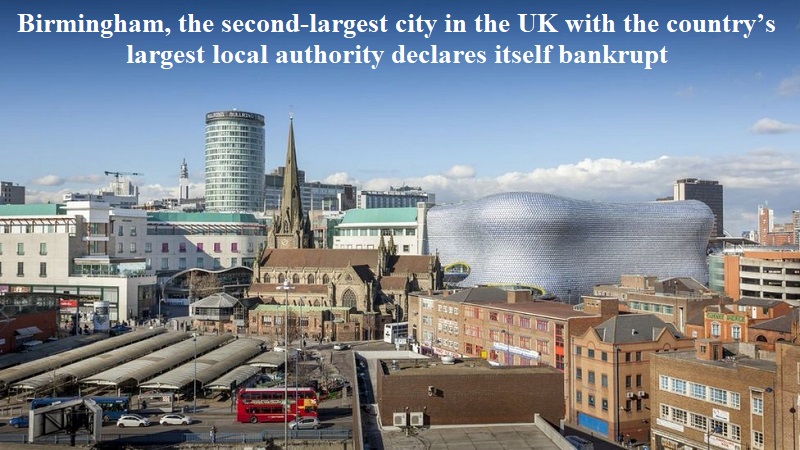
Birmingham, the United Kingdom’s second-largest city and home to the country’s largest local authority, declared bankruptcy on Tuesday, September 5, after issuing a Section 114 notice indicating its inability to balance its books. Nevertheless, the city council’s leader has reassured that essential services remain secure.
The Labour-run council in central England, in opposition, has attributed years of underfunding by Conservative governments as it grapples with settling a £760 million (approximately US$980 million) bill for equal pay claims.
Simultaneously, Birmingham City Council has issued a Section 114 Notice under the Local Government Finance Act 1988, effectively suspending all expenditure except for essential services mandated by law, including social care, waste collection, and safeguarding the vulnerable.
The council has cited “long-standing issues” such as the implementation of a new IT system and £1 billion (approximately US$1.3 billion) in budget cuts over the past decade under successive Conservative administrations as contributing to its current predicament.
The leader and deputy leader of the Labour-run council, John Cotton and Sharon Thompson, stated in a Guardian-quoted statement that, “Like local authorities across the country, it is clear that Birmingham city council faces unprecedented financial challenges.” They pointed to substantial increases in adult social care demand, “dramatic reductions” in business rates income, and “rampant inflation” as factors creating a “perfect storm” for local government.
Cotton acknowledged that “tough and robust decisions” would need to be made, with concerns that budget cuts could impact the city’s roads, parks, and libraries. Meanwhile, Conservative members of the council have blamed Labour’s mismanagement of the city’s finances.
During a council meeting on Tuesday, Robert Alden, the leader of the Conservative opposition, accused the council of “lying to the people of Birmingham” and dismissed their claim of the city “facing a golden decade” under Labour leadership as “fools’ gold.”
Downing Street expressed concern for Birmingham’s residents, with the government pledging to provide an additional £5.1 billion (approximately US$6.4 billion) to councils in 2023-24, including a more than nine percent increase for Birmingham City Council. The Prime Minister’s official spokesperson emphasized that “clearly it’s for locally elected councils to manage their own budgets” and mentioned the government’s concerns about “their governance arrangements.” Additionally, the British government has “requested assurances from the leader of the council about the best use of taxpayers’ money.”
The spokesperson acknowledged Birmingham’s “particular issue” with equal pay settlements and mentioned that ministers had “commissioned an independent governance review which will report in the coming weeks.”
This declaration of financial distress by Birmingham follows similar actions taken by Croydon Council in south London, which issued a Section 114 notice in November the previous year, and Thurrock Council in Essex, east of London, which declared financial distress in December.

Post Your Comments